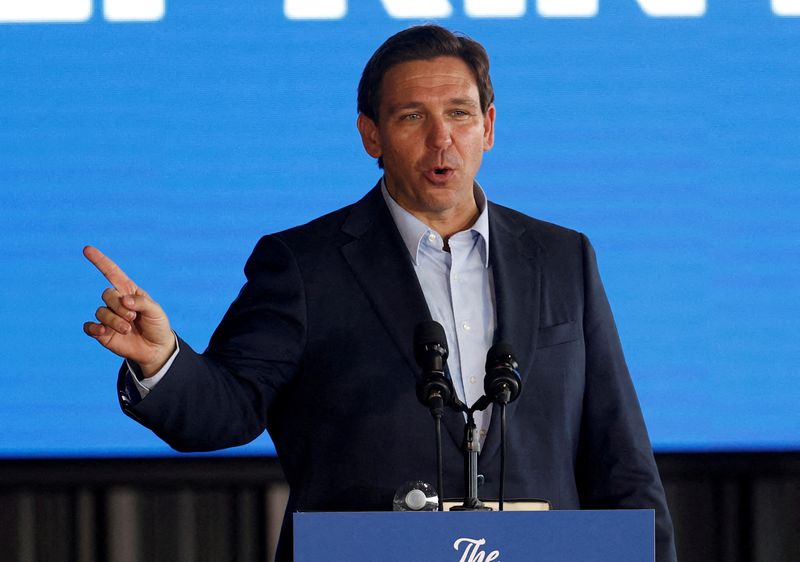By Tom Hals
WILMINGTON, Delaware (Reuters) - Now that the year-long war of words between Florida Governor Ron DeSantis and the Walt Disney (NYSE:DIS) Co has landed in the courts, the Republican leader might find his verbal barbs directed at the entertainment giant coming back to bite, legal experts said.
Disney on Wednesday sued DeSantis to prevent the state from ending the company's virtual autonomy in central Florida where it has its theme parks.
The suit comes a year after the company criticized a Florida law banning classroom discussion of sexuality and gender identity with younger children, prompting DeSantis to repeatedly attack "woke Disney."
Disney said DeSantis' actions amounted to a "targeted campaign of government retaliation."
The company's 73-page lawsuit is filled with blunt warnings from DeSantis' memoir, fundraising material, interviews and announcements that the entertainment giant had "crossed a line" into the realm of politics and had to be reined in.
Ken Paulson, a professor at Middle Tennessee State University, said the governor may come to regret his attacks on the company.
"There's a very good chance that he's going to pay for those in a court of law," said Paulson, the director of the school's Free Speech Center.
DeSantis has called Disney's lawsuit a politically motivated attack and accused the company of lacking accountability.
The governor's spokesman said on Wednesday that his office was unaware of any legal right that allows a company to operate its own government or maintain special privileges, a reference to the decades-old district that is home to Disney World.
Legal experts said DeSantis may have sound policy reasons to reconstitute the authority formerly known as Reedy Creek Improvement District, but if Disney can show it was done as retaliation, the company has a strong case.
The fallout between Florida's biggest employer and its governor with presidential aspirations began last year.
Pressured by its employees, Disney spoke out against the Parental Rights in Education Act that banned discussion of sexual orientation and gender identity for young students, dubbed by critics as the "don't say gay" bill.
DeSantis hit back, marshalling the Republican legislature to eventually seize control from the company of the special district that helped develop Disney World.
Disney claimed in its lawsuit that the state adopted a "targeted campaign of government retaliation — orchestrated at every step by Governor DeSantis as punishment for Disney’s protected speech."
The U.S. Supreme Court in a 2010 case known as Citizens United ruled that government could not limit political speech of corporations and other entities under the First Amendment of the U.S. Constitution.
HISTORY AND CONTEXT
For Disney to prevail, a jury would have to find a connection between the company's comments and the changes to the development district, renamed under DeSantis' control as the Central Florida Tourism Oversight District.
DeSantis may argue that government has given the company special tax benefits over the years and Florida is entitled to change that.
But Leslie Kendrick, the director of the Center for the First Amendment at University of Virginia School of Law, said it will come down to the reason for the changes.
"First Amendment law would say that is problematic if it's done because of the speaker's protected speech," Kendrick said.
DeSantis' tough talk toward Disney is cited throughout the lawsuit, including 18 quotes referring to some form of "woke Disney."
The lawsuit cites an opinion piece DeSantis wrote for the Wall Street Journal in which he said when companies like Disney use their power to "advance a woke agenda," leaders must fight back or they surrender "the political battlefield to the militant left."
Legal experts said examples of retaliation for political speech often involve state employees.
One business example Kendrick cited involved a newspaper tax imposed on publications with a circulation of 20,000 in Louisiana in 1934, influenced by the state's powerful senator, Huey Long. The law was largely seen as punishing a student paper critical of the former governor, even though it impacted 13 publications, many of which sued.
The lawsuit over the tax eventually made its way to the U.S. Supreme Court, which struck it down in a case known as Grosjean v American Press Co.

The justices said the tax was seen as a deliberate attempt to limit the spread of information and it was "suspicious" the way law was developed.
"History and context really matters," Kendrick said. "If there is evidence that you did it for reasons that implicate the First Amendment, to punish the speaker, then we have a problem."